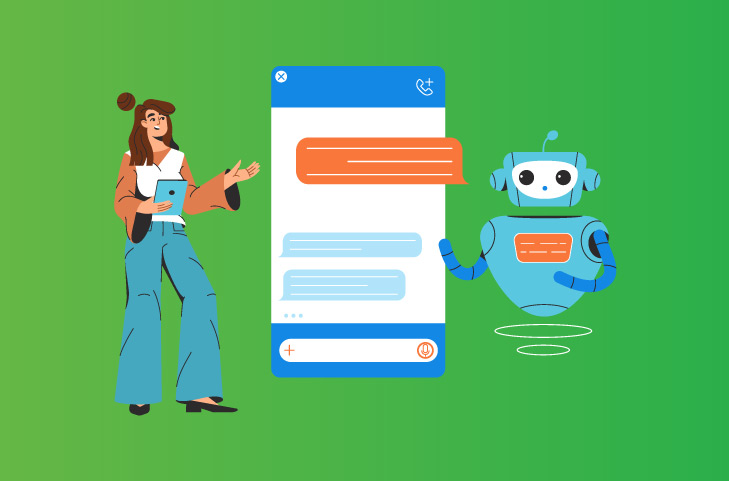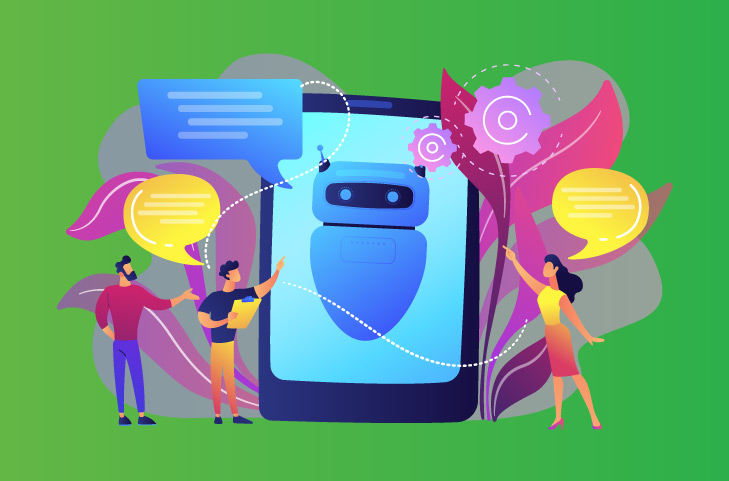This is the era of digitalization and customer experience. The customers that were previously relying on sales reps to help through the purchase are now becoming highly independent. And your sales reps are left with roughly 5% of the customer’s time during their B2B buying journey.
Not to mention, the market is more competitive than ever before, and customers have more options to consider even before they visit your website. Safe to say, this market change – combined with the fact that 80% of B2B purchases are impacted by a customer’s experience – means businesses need to prioritize personalization and leave a good first impression on the customer.
Enter chatbots in B2B marketing. By introducing chatbots into your marketing strategy for customer support, content distribution, lead qualification, and more, you can easily keep up with the changing customer needs in real-time.
In this blog, we’ll discuss the various opportunities and challenges brought by chatbots in B2B marketing.
Chatbots for B2B Marketing

Faster response rates. Reliable solutions. Personalized Experience. This is what an AI chatbot brings to the table. Since the new B2B buyer is more in control of their journey, chatbots are the perfect tools to enhance your involvement in their journey. How?
Here are the various opportunities to leverage B2B marketing chatbots for your business –
1. Power Customer Communication
Customers want accurate information, quicker responses, and feel appreciated by the businesses they interact with. B2B marketing chatbots are your number one tool in powering your customer communication.
They can help fast-track the sales process by answering customer queries, thus reducing the time they spend online researching independently. Instead of manning a live chat with a customer support team who might not be available all the time or is too slow to answer, you can use chatbots to offer quick service – as preferred by 62% of customers.
The best part? You can customize the tone of your chatbots and constantly tweak answers to best fit your customer needs and actively provide a better experience.
2. Boost the Lead Generation Process
Chatbots also offer you the opportunity to improve your lead generation and qualification process. From reducing lead response time to personalizing conversations, chatbots can be immensely helpful in qualifying, engaging, and converting leads.
- AI chatbots can tap into past interactions and customer data to understand the buyer’s unique needs and create an excellent chat experience
- They can assist the sales team with leads qualification based on the most desirable attributes
- Chatbots are perfect for nurturing leads as they can automate follow-up emails or messages with personalized offers
3. Make Content Easily Accessible
If a buyer visiting your website can’t find what they were looking for, you bet they will bounce. Since today’s buyer journey is all about independent research, providing easy access to content early in their journey is the key to engaging them.
And B2B marketing chatbots are all you need to encourage self-service and instant content discovery. When a buyer is looking for information, they can interact with a chatbot that can address their concerns, direct them to landing pages, offer exclusive content, share eBooks, blogs, and more.
4. Include Data Analytics
Your marketing efforts will only be as efficient as your insights into the customer. Data is the key to making intelligent, customer-centric decisions. And you can utilize the chatbot’s conversation history to take a deeper dive into customer needs and expectations. It helps you learn about customer trends and their most common queries.
Moreover, chatbot data offers you valuable insights into its performance and user satisfaction, which you can leverage to improve its efficiency. All this, ultimately, helps you stay one ahead of the competition by prioritizing the customer.
Challenges of Using Chatbots in B2B marketing

On the surface, a chatbot interacting with your customers, managing your online presence, and taking over your sales efforts may seem like it can easily replace you. That’s the thing with AI chatbots. These systems still need human intervention to support your marketing efforts.
But all automated systems have certain limitations, and if not managed effectively, they could affect your business.
One of the major challenges with chatbots is security. When your customers share their information with an AI chatbot, they want to be assured that businesses respect their privacy and keep the data safe. That is why it is important to have your chatbot collect only relevant information and record it safely to prevent misuse.
In addition, since human touch is a critical part of customer experience, it might be challenging to achieve that with chatbots. They might be quicker than your customer service team, but can they put the same emotions in customer conversations as them? If they are not able to bring a human touch to their customer interactions, you might want to rethink your approach.
The Bottom Line

As excellent customer experience becomes a priority, chatbots emerge as an indispensable tool to take your efforts to the next level. They will not only enhance your customer support but actively help fast-track conversions and drive higher personalization.
However, you can only make the most of these tools once you can effectively overcome the security challenges and bring in the much-needed human essence to customer interactions. That said, the benefits of chatbots in B2B far outweigh the challenges. Besides, with continuous advancements in technology, AI-driven chatbots are only going to get better and allow their early adopters to become more competitive.


